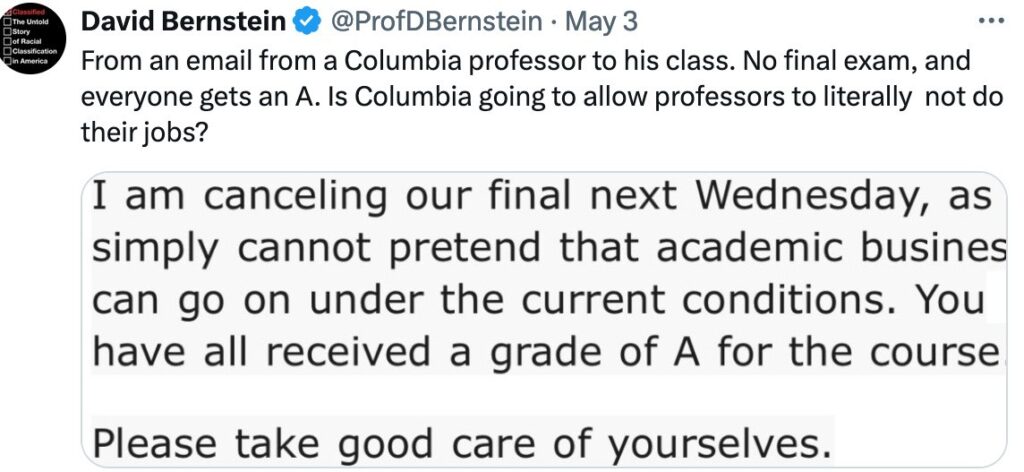As Australian’s go about their day to day lives, an unsurpassed quality of life full of beaches, sport and beer, life for many Australian’s Jews has become somewhat dystopian.
As we emerged from the Passover festival, a barrage of social media and news awaited. It was primarily focussed on encampments on Universities around Australia and the failure of University administrations to contain or condemn hate speech, which is apparently within the acceptable bounds of free speech.
I watched as a University student broke down due to the relentless barrage of intimidation and the volume of vitriolic social media traffic to contend with. It has got to the stage where Jewish students do not want to go to campus, do not feel supported, and in many cases do not want to continue their education.
Does this mean the social disruptors and supporters of terrorists are winning? Perhaps the even more important questions are; to what extent is Australia losing its talent and future workforce, its multicultural harmony, its academic reputation, and its values?
Last Friday morning, Prime Minister Albanese met with members of the Australian Rabbinate. Reactions from amongst the Jewish community were mixed, ranging from “finally this occurred” through to “the current Government does not deserve to be mollycoddled by our Rabbi’s”. Nonetheless, as an opportune moment to discuss the impact of anti-Semitism, it was a great photo opportunity for our PM.

The PM also posted a photo op from this meeting to his twitter feed on Friday. Two days later it has over 525,000 impressions and more than 2,600 comments. If you don’t think Australia has a problem with anti-Semitism then take a few minutes to visit this tweet and doomsday scroll through the comments to see some of the most hateful and bigoted statements you will ever read anywhere in the world. Apparently the PM makes a point of not looking at social media comments, but if it took the chance in this instance he would quickly realise just how much of an anti-Semitism problem he has.
Today a news article has appeared noting that Education Minister Jason Clare has declined to take a stand on slogans that call for the annihilation of Israel, including calls for “intifada” and chants of “from the river to the sea”.
“Any words that stoke fear in our community or make people not want to go to university are intolerable,” Mr Clare said. “I’ve seen people say that those words mean the annihilation of Israel. I’ve seen people say that it means the opposite. I’ve seen people say that they’re slogans that Israeli political parties have used. What I’d say is this. What I want all Australians to be arguing for, to be calling for, is a two-state solution. Two countries, two people, two states side by side where people can live in peace without fear, without terrorism, without checkpoints, without occupation.”
Maybe Mr Clare should read the Hamas charter, proudly published in Arabic and English that clearly uses the phrase “from the river to the sea” in conjunction with a call for the elimination of the Zionist State. This is the origin of the phrase and no ambiguity on their part as to what it means. It is disingenuous to suggest that students in Australia should tell Hamas that their phrase might not mean what they say it means. Especially when Hamas follow through on their murderous words with murderous deeds.
Better still, ,maybe Mr Clare should go to Gaza and explain to Hamas that “from the river to the sea” could mean the opposite of eradicating Israel. He should then call for a two state solution and peaceful coexistence. What would happen, I wonder?
Cynacism aside, from all of this we discern that our political and academic leaders of the tertiary sector have no ability, nor inclination, to make our university campuses safe for Jewish students. In the same speech that Mr Clare says there is a right to protest, he says “there is no place for fear, intimidation and hate.” But the evidence is right there that there is in fact fear, intimidation and hate and that it is sanctioned under the guise of free speech.
Jonathan Tobin from the JNS expresses it well. He notes that mobs of students chanting for the destruction of Israel and shouting slogans in favour of terrorism against Jews should not be tolerated by Universities. Attempts to appease the protesting bullies will only embolden them, and tolerance of their hate speech is nothing more than a gesture that legitimises Hamas’ genocidal cause of destroying the Jewish state and slaughtering its population. It normalises what ought to be labelled as an outrageous expression of hatred. It means an acceptance of the vile idea that antisemitism is a legitimate form of discourse.
This is precisely what is confronting our Jewish students this week. But there is a broader impact that should also be considered.
It is not a new phenomenon that tertiary institutions are a hotbed of rebellion and radical expression. Yet at the same time our universities have produced knowledge, skills, research and breakthroughs in science, technology. They have traditionally improved our industries and enhanced our productivity.
Sadly, the relationship between tertiary qualifications and new industry development is growing far apart. Education has changed, and so has business. Graduates today learn more on the job than they do in the classroom. Employers often remark that their graduate intakes are not job-ready, sometimes lacking technical skills, but also basic literacy, numeracy, and the soft skills of communication and relationship management.
At the extreme end of the spectrum, the nexus between Gaza protestors and erosion of academic standards is reflected in the following US example:

There is a more sustained and systemic impact that Australia needs to consider as it continues to lose respect and reputation for its universities, and the international students that once coveted our qualifications.
For many years I have been visiting Israel and engaged in the technology transfer and monetisation of academic research from Israel across its nine internationally recognised universities. Israel’s innovation eco-system is one of the most developed in the world, shaped by a sophisticated mix of major global investors, start-ups, skill development through national service, and tertiary sector commercialisation.
Israel has the highest world ratio of university degrees to population. Israel has the highest per capita ratio of scientific publications in the world by a large margin, as well as one of the highest per capita rates of patents filed. Israel also publishes the most academic articles per capita of any nation.
There are more than 350 multinational research and development (R&D) centres in Israel. On the back of the rapid expansion of the hi-tech sector, services exports account for over half of Israel’s total exports. Israel leads the world in the ratio of high-tech employees with 9.5% of the labour force working in the sector.
There is a unique culture within Israel of technology transfer and commercialisation that is led from within the tertiary institutions. The Chief Scientist, a governmental office is responsible for encouraging scientific research in Israel through the provision of conditional research grants.
The development of the Israeli innovation-based economy was no accident. It was the product of strategic leadership, smart policies and an effective partnership between industry and government to create a unique model of market-driven innovation. It has allowed economic growth and the creation of billions of dollars of revenue. Israel now ranks as the world’s 28th largest economy by nominal GDP, the only country in the world in the past 50 years that has moved from a third world to a first world economy.
Australia could benefit from all of this and more. Our Government is striving for new industry, productivity growth, and economic enablement. Bilateral trade was flourishing and diplomatic relations between Israel and Australia were delivering new opportunities for our country until the last general election.
Yet Australia is now spiralling backwards, socially and economically.
Part of the solution may well be to reverse the political culture wars that have already hijacked our Universities, and to reclaim the role of the university as the catalyst for economic productivity.
Israel has been very successful in creating global social benefits and the generation of new wealth through commercialisation and technology transfer. Australia has an abysmal record of commercialising its academic research. There are ineffective models of incentivisation, and little benefit for industry to partner with academia in the current climate.
Instead of driving Jewish students and supporters of Israel from our Universities, we should embrace them.
Instead of displaying political hostility to Israel as it proceeds to eliminate the intolerable terrorism that breaches its borders, we should embrace its democratic and societal values, and share in its successful models of economic and academic prosperity.
